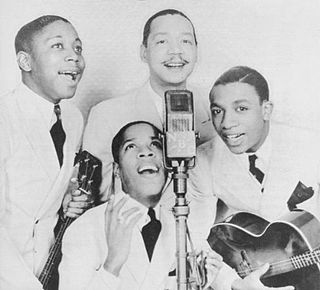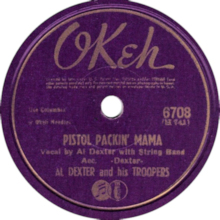Related Research Articles

The Ink Spots were an American vocal pop group who gained international fame in the 1930s and 1940s. Their unique musical style predated the rhythm and blues and rock and roll musical genres, and the subgenre doo-wop. The Ink Spots were widely accepted in both the white and black communities, largely due to the ballad style introduced to the group by lead singer Bill Kenny.

Doris Fisher was an American singer and songwriter, collaborating both as lyricist and composer. She co-wrote many popular songs in the 1940s, including "Whispering Grass", "You Always Hurt the One You Love", "Into Each Life Some Rain Must Fall", "That Ole Devil Called Love", and "Put the Blame on Mame." Her songs were recorded by the Ink Spots, Louis Prima, Billie Holiday, Bing Crosby, the Andrews Sisters, Pearl Bailey, the Mills Brothers and Ella Fitzgerald amongst others.
"If I Give My Heart to You" is a popular song written by Jimmy Brewster, Jimmie Crane, and Al Jacobs. The most popular versions of the song were recorded by Doris Day and by Denise Lor; both charted in 1954.
"Wanted" is a popular song written by Jack Fulton and Lois Steele. A recording by Perry Como was the most popular version, reaching No. 1 in the US. Al Martino also recorded a version which reached No. 4 in the UK.
"Blues in the Night" is a popular blues song which has become a pop standard and is generally considered to be part of the Great American Songbook. The music was written by Harold Arlen, the lyrics by Johnny Mercer, for a 1941 film begun with the working title Hot Nocturne, but finally released as Blues in the Night. The song is sung in the film by William Gillespie.

Between 1935 and 1955, American singer Ella Fitzgerald was signed to Decca Records. Her early recordings as a featured vocalist were frequently uncredited. Her first credited single was 78 RPM recording "I'll Chase the Blues Away" with the Chick Webb Orchestra. Fitzgerald continued recording with Webb until his death in 1939, after which the group was renamed Ella Fitzgerald and Her Famous Orchestra. With the introduction of 10" and 12" Long-Playing records in the late 1940s, Decca released several original albums of Fitzgerald's music and reissued many of her previous single-only releases. From 1935 to the late 1940s Decca issued Ella Fitzgerald's recordings on 78rpm singles and album collections, in book form, of four singles that included eight tracks. These recordings have been re-issued on a series of 15 compact disc by the French record label Classics Records between 1992 and 2008.
This is a list of notable events in country music that took place in the year 1949.

"I'll Get By (As Long as I Have You)" is a popular song with music by Fred E. Ahlert and lyrics by Roy Turk that was published in 1928. Versions by Nick Lucas, Aileen Stanley and, most successfully, Ruth Etting, all charted in America in 1929.
"I'm Beginning to See the Light" is a popular song and jazz standard, with music written by Duke Ellington, Johnny Hodges, and Harry James and lyrics by Don George and published in 1944.
"(I Love You) for Sentimental Reasons" is a popular song written by Ivory "Deek" Watson, founding member of the Ink Spots and of the Brown Dots, and William "Pat" Best, founding member of the Four Tunes.
"Hey Joe!" is a 1953 popular song written by Boudleaux Bryant. It was recorded by Carl Smith for Columbia Records on 19 May 1953 and spent eight weeks at No. 1 on the US country music chart, marking Bryant's first no. 1 record. He later wrote songs with his wife Felice for The Everly Brothers. The song was first published in New York on July 17, 1953 as "Hey, Joe".
"Into Each Life Some Rain Must Fall" is a 1944 song performed as a duet by The Ink Spots, featuring Bill Kenny, and Ella Fitzgerald. Their recording was made on August 30, 1944 for Decca Records. The song was written by Allan Roberts (lyrics) and Doris Fisher (melody). The name of the song originates from a quotation of Henry Wadsworth Longfellow from the poem "Rainy Day". The song has also been included in the soundtrack for several videogames.

"Pistol Packin' Mama" was a "Hillbilly"-Honky Tonk record released at the height of World War II that became a nationwide sensation, and the first "Country" song to top the Billboard popular music chart. It was written by Al Dexter of Troup, Texas, who recorded it in Los Angeles, California on March 20, 1942, with top session musicians Dick Roberts, Johnny Bond and Dick Reinhart, who all normally worked for Gene Autry. It was used in the 1943 film Pistol Packin' Mama, starring Ruth Terry and Robert Livingston.
For music from an individual year in the 1940s, go to 40 | 41 | 42 | 43 | 44 | 45 | 46 | 47 | 48 | 49

William Francis Kenny Jr. was an American vocalist with a wide vocal range spanning four octaves. Often regarded as one of the most influential high-tenor singers of all time, Kenny was noted for his "bell-like" vocal clarity and impeccable diction. Although he is most famous for his role as lead tenor with the Ink Spots, Kenny also led a successful solo career after disbanding the Ink Spots in 1954. Throughout the 1950s and 60s Kenny recorded, toured the world and appeared on many popular variety television shows. In 1966 Kenny became the star and host of his own musical variety show The Bill Kenny Show which aired on CBC. In 1989, 11 years after his death, Bill Kenny was inducted into the Rock and Roll Hall of Fame. Kenny is often noted as being the "godfather" of R&B tenor vocalists.
"We Three " is a ballad published in 1939 by Nelson Cogane, Sammy Mysels and Dick Robertson. It was a hit song in 1940 for both The Ink Spots on Decca and Frank Sinatra with the Tommy Dorsey Orchestra on RCA Victor, both versions reaching No. 3 in Billboard in December.

South Pacific is a compilation album of phonograph records by Bing Crosby, Danny Kaye, Ella Fitzgerald and Evelyn Knight released in 1949 featuring songs from the Rodgers and Hammerstein musical, South Pacific. The album was placed 8th in Billboard's chart of best-selling popular record albums in July 1949.
"Surrender" is a 1946 song co-written by Bennie Benjamin and George David Weiss. It was originally performed by Perry Como and covered by various artists including Woody Herman, George Olsen, and Bob Chester. Como's version of "Surrender" peaked at number one on the Billboard Best Selling Popular Retail Records chart and sold over a million copies.

The singles discography of American singer Ella Fitzgerald contains 166 singles and six other charting songs. Her first recordings were collaborations with orchestras, beginning with the charting song "All My Life" with Teddy Wilson. It was followed by her first US top ten entry called "My Melancholy Baby". She also made the US charts three times under the title Ella Fitzgerald and Her Savoy Eight. Fitzgerald then collaborated with Chick Webb and His Orchestra, topping the US charts in 1938 with "A-Tisket, A-Tasket". She reached the top ten three more times with Webb, including the top five single "F.D.R. Jones". With her own orchestra, Fitzgerald reached the top ten in 1939 with "I Want the Waiter " and in 1940 with "Five O'Clock Whistle".
References
- ↑ "Decca matrix 72371. I'm making believe / Ella Fitzgerald - Discography of American Historical Recordings". adp.library.ucsb.edu. Retrieved 2022-04-23.
- ↑ Holden, Stephen (16 June 1996). "Ella Fitzgerald, the Voice of Jazz, Dies at 79". The New York Times . New York. Archived from the original on 6 April 2009. Retrieved 15 May 2017.
- 1 2 Johnson, J. Wilfred (2001). Ella Fitzgerald: An Annotated Discography; Including a Complete Discography of Chick Webb. Jefferson, North Carolina; London: McFarland & Company. ISBN 978-0-7864-4690-2 . Retrieved 19 May 2017.
- ↑ Tyler, Don (2007). Hit Songs, 1900-1955: American Popular Music of the Pre-rock Era. McFarland. p. 275. ISBN 978-0786429462 . Retrieved 15 February 2018.
- ↑ "The 17th Academy Awards | 1945". Oscars.org . AMPAS. 4 October 2014. Retrieved 20 May 2017.
- 1 2 Fritts, Ron; Vail, Ken (2003). Ella Fitzgerald: The Chick Webb Years & Beyond. Laxham, Maryland; Oxford, England: Scarecrow Press. ISBN 0-8108-4881-3 . Retrieved 15 May 2017.
- ↑ Gilliland, John (January 15, 1972). "Pop Chronicles 1940s Program #11". UNT Digital Library.
- 1 2 Nicholson, Stuart (1993). Ella Fitzgerald: A Biography of the First Lady of Jazz (Reprint ed.). C. Scribner's Sons. p. 81. ISBN 0684196999 . Retrieved 15 February 2018.
- ↑ Nicholson, Stuart (2004). Ella Fitzgerald: The Complete Biography. New York, London: Routledge. ISBN 0-415-97119-5 . Retrieved 15 May 2017.
Released as two sides of a 78 disc…
- 1 2 "Records Most Played on the Air". Billboard. 17 February 1945. p. 20.
- ↑ "Popular Record Reviews". 28 October 1944. p. 21.
{{cite magazine}}: Cite magazine requires|magazine=(help) - ↑ "Popular Record Reviews". 30 December 1944. p. 13.
{{cite magazine}}: Cite magazine requires|magazine=(help) - ↑ "Best Selling Retail Records". The Billboard. Cincinnati, Ohio. 9 December 1944. Retrieved 23 March 2018.
- ↑ "Best Selling Retail Records". The Billboard. Cincinnati, Ohio. 16 December 1944. Retrieved 23 March 2018.
- ↑ "Most Played Juke Box Records". The Billboard. Cincinnati, Ohio. 23 December 1944. Retrieved 23 March 2018.
- ↑ "Harlem Hit Parade". Billboard. 13 January 1945. p. 17.
- ↑ "Records Most Played on the Air". Billboard. 3 February 1945. p. 18.